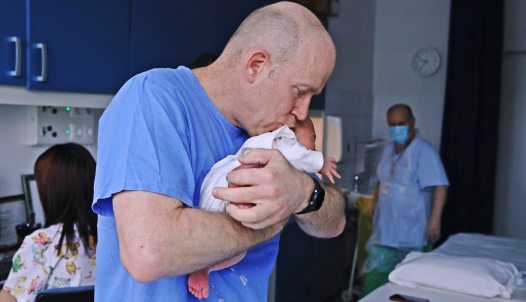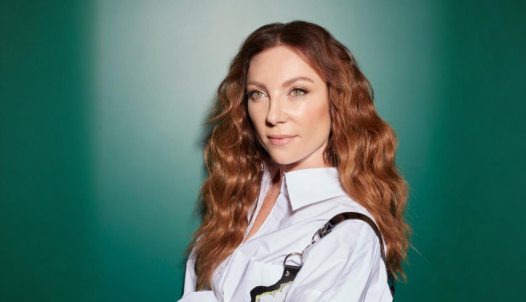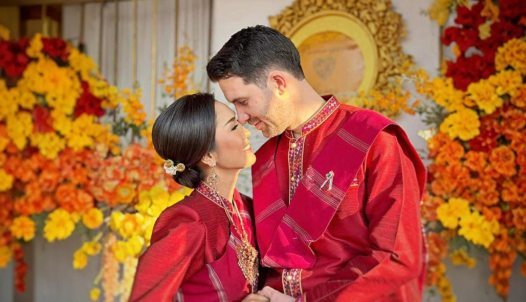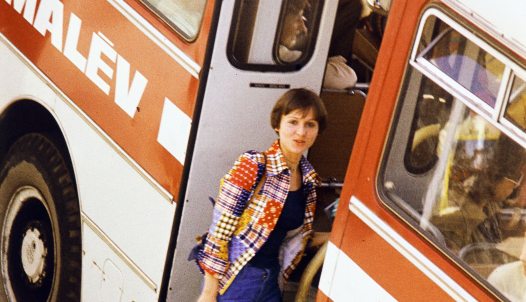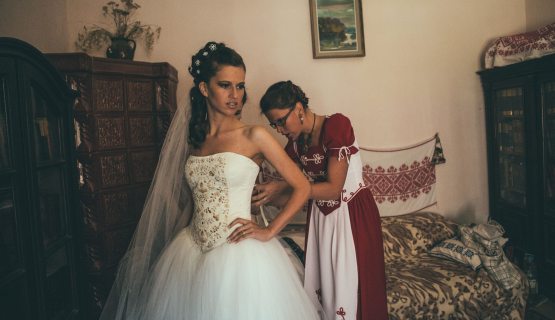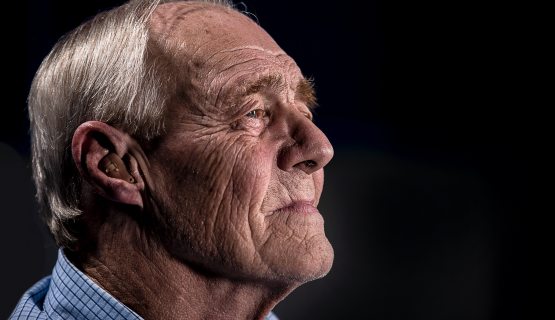The family-friendly head of a family-friendly hospital – In conversation with Dr. György Velkey
This was not my first interview with Dr. György Velkey, and yet I was still consumed with curiosity: would we be able to have such a good chat about his private life as we had earlier about his work. It turned out that the director of Bethesda Children’s Hospital (and chairman of the Society of Hungarian Paediatricians) is by no means solely interested in his profession; he is an enthusiastic sportsman, a great traveller and active ‘culture consumer’ who is happy to talk about his family as well.
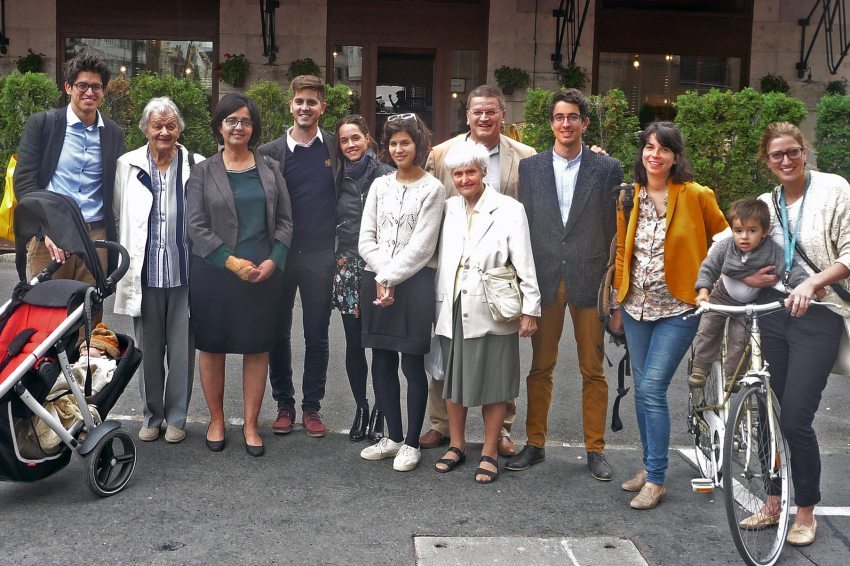
An institution can be family-friendly when its director is as well. Bethesda is one of the most family-friendly hospitals in Hungary. You have five siblings, five children and soon five grandchildren. What does family mean in your life?
“Family for us is an extremely important, living institution. My ancestors going back many generations were large and cohesive families. In different historical situations, only family represented a fixed point, this is how we survived communism.
“We are six siblings in all – I am second in line – and there are 37 cousins. Our small – to some, big – family fits in to this multi-generational great family.
“I consider my parents, my two grandfathers and several uncles to be my role models. They were marvellous characters, they lived in natural faith in God, practically, ready to act and in sustaining love. They had no suffering religiosity, no glazed kindness. They were true to life, humorous, genuine. They underwent countless trials yet they always stood by their principles and faith.”
Is there anything to do with your family that means you became a paediatrician and then director?
“Partly socialization, and partly character may be the reason that I have a qualification as a paediatrician and anaesthesiologist-intensive therapy specialist. When I started university, intellectually speaking I was most attracted to psychiatry. But I was always involved with young children; I learnt about and got to love the world of children thanks to my own siblings and my many cousins. My specialist medical work demands the ability to reach decisions very quickly and concentrated action, this suits my character. I became a manager early on – I think largely as a result of my extremely intensive acquisition of professional experience, my strong sense of purpose and the social routine deriving from coming from a large family. In our wider family, the most popular profession is teaching, but there are many doctors and nearly all of them are paediatricians, one of my own sons included. Not only do I work in a managerial position, but my siblings are largely in this area, too, and as I see it, the potential for this is in my children as well.”
Not forgetting your wife, who is a deputy head of department...
“I was a classmate of Anikó. She comes from the world of kulaks, a child of a family from the settlement of Túrkeve, contrary to our urban, middle class, large family background. We came from very different environments, to this day we are still shaping our own little world, which from several angles resembles ours, yet she also brought along countless elements. Her grandparents were hard-working peasants, and her parents – similarly to my ancestors – were badly damaged by communism. As thrifty people, they were able to provide solid financial security in comparison with our more easygoing attitude to life. In the end, the two different cultures tended to complement one another. My wife is a quiet Kun girl with a determined opinion. She is a highly intelligent, well-read, thoughtful person. I am quick to reach decisions and prefer action; she is slower, and more hesitant, but a persistent type. We have much to learn from one another and it was not always easy that our reflexes were different. At one time we often quarrelled, and we occasionally still do because of this, but on the whole, I reckon this has a good impact on the family because it opens up lines of communication.”
You became a manager early on so I suppose the raising of your five children fell more to your wife, despite which she did not give up working. On top of this, she has been your subordinate for years…
“The drive of the profession caught me very early on, I worked a massive amount and indeed I became a manager quite soon. However, given her character and in line with her role as a mother, she became a children’s radiologist, which is a far more closely bound and closed world, more monotonous and rational work, and easier to harmonize with family life. It was a good compromise. Anikó has enormous energy and is able to bear stress on both fronts. Even so, I played my part in family tasks. Our parents, primarily her mother, helped a great deal, but my parents were always on hand to help out.
“In other words, the extended family provided the background for both raising children and work, and there was no situation in which we didn't have immediate help..
“As far as the boss-subordinate relation goes, we studied together as university students and later on we worked together. I was not yet director when she returned to work. It was better that it worked out this way. I think we can handle this situation perfectly. We rarely talk about work at home, we look on it as different tasks and not a hierarchical question. After the initial surprise, everyone in the hospital accepts it as natural and nobody lobbies via my wife. Instead, I had to make sure that her department did not suffer a disadvantage because initially my reflex was not to make any exceptions for her. By now, I reckon I have got the proportion right. She likewise takes part in meetings like all the others; if she has to, she’ll use arguments, not infrequently even going against me, but this is right and proper. I weigh up her personal feedback. She has a critical nature, she mainly notes what she doesn’t like, which of course sometimes I remark on.”
Still, five young children for two very busy doctors who love their profession cannot have been easy...
“Children liberate me! I adore being with my children and now my grandchildren, they represent rest and recuperation. But it is a fact that we lived in a heightened state, both of us put in massive amounts of duty time and I was on call 24-7 for decades. This meant that I would dash into the hospital at any time and from anywhere. Our children got used to us not having a typical lifestyle, but one with a lot of flexibility and adaptation. They didn’t complain at the time but since then it turned out that they didn’t necessarily enjoy it. I sense that they are now compensating for this: in their lives they make greater effort to ensure secure and peaceful situations. But I am still convinced that overall, their extremely lively childhood had a good impact on them: they are all flexible people ready to act.”
Has your lifestyle changed as grandparents?
“These days it is frequently just the two of us since the children are not at home on weekdays. Anikó continues to work hard, she has several jobs, she is frequently on call and duty. I also work 10-14 hours a day but in a more flexible schedule. Our children count on us, we have a quite intense relationship. If everything works out, I spend an afternoon with my grandchildren each week, and my wife is with them for a day after her on-duty. They ask for help when it is necessary but they have their own world so we are in the right place as grandparents. In fact, the centre of family life has shifted to the Balaton, where we have managed to build a large ‘Hosting house’. If I go back three generations, there was always such a spacious house serving as the meeting point for the family, located in various parts of the country. Our children spend a lot of time there and we rush down there, too, when we can.”
Have you any time for a hobby or voluntary work?
“I love my work but a lot of other things as well. For example, running. We have a team made up of colleagues, I was the slowest but I want to improve through a regime of consistent exercise. I enjoy playing tennis, we go every week with one of my sons and my nephews; this is the only sport that I am still competitive in. I would also mention skiing and tarot card games – we regularly do both with friends and family. The arts are of fundamental importance so each week we go at least once to the theatre or a concert, sometimes the cinema, and we read a lot (I mainly read poetry). We really love travelling and when she can, my wife accompanies me on business trips. Last year, for example, we packed a lot in, we travelled to Japan and America, but besides that each spring we go with one or two couples we know to some exciting destination, this year, for example, we went to the Basque Country. Wherever we are, galleries are my most important target. We have many friends, both within and outside the hospital, but we also get on very well with my siblings and we spend a lot of time together.
“I consider the Hungarians beyond the border to be very important, I frequently take part in various events, health screenings, lectures, courses – most frequently in the sub-Carpathian region and Transylvania.”
You espouse your faith as a professional and a manager but we don’t know much how you experience that as a private person.
“Just as my ancestors, we too concentrate on our everyday life and not on solemnity and formalities, living our faith in strong, Christian communities. However, we have all had to go through that ‘crisis situation’ when the faith received from home and lived in communities becomes a personal, God experience. Thank God, our parents also inspired us for this and we, siblings, also inspired each other. This freedom is very important for us, we received that attitude towards life in which it is worth living, but there was no obligatory system of form.
“It is a special gift that we grew into three churches: my father was Catholic, my mother was Reformed, my grandmother on my father’s side was Lutheran. Authentic lives lived in different framework systems had a strong impact on us. Today, I feel at home in all the churches.
“My religious life is today more solitary and individual than it used to be: in the morning, we leave home with the Reformed daily prayer, I live a contemplative, meditative life of prayer, and every year I attend a retreat. Sometimes we attend Catholic mass and sometimes the Reformed, or not infrequently Evangelical service.”

